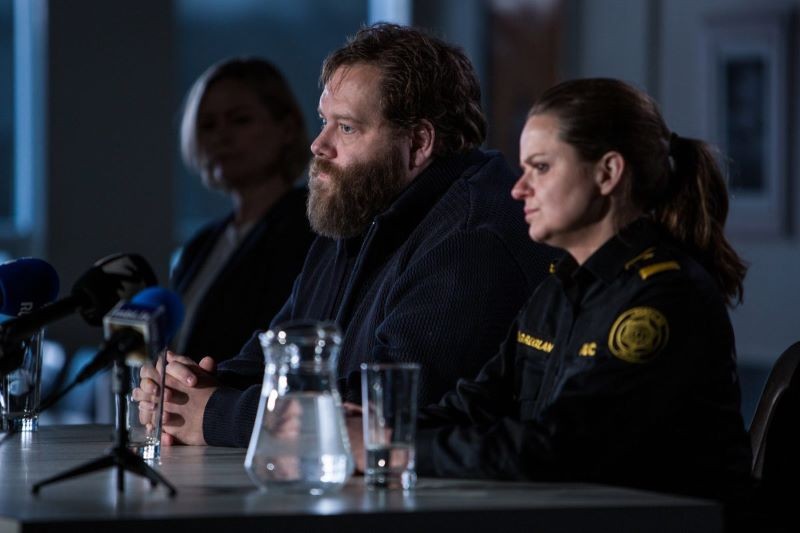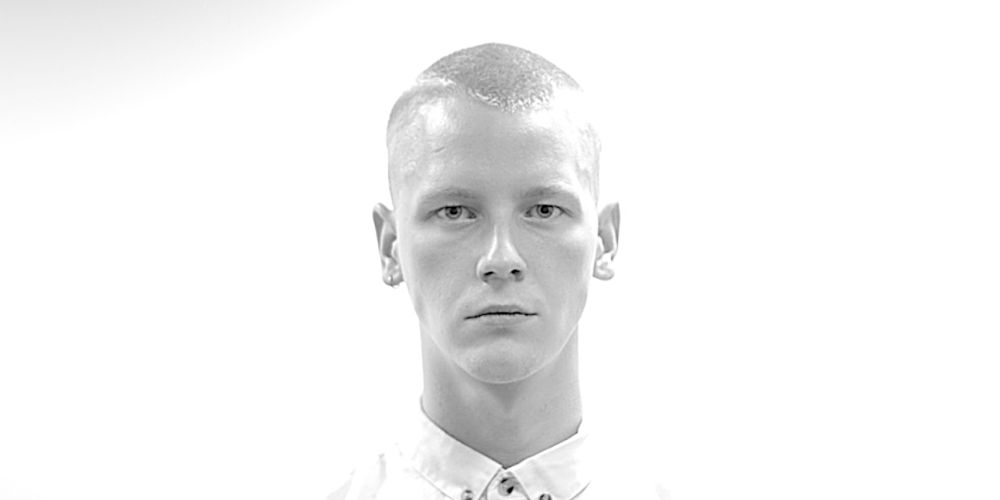On A Global Scale: From Iceland to New York and Back
Welcome to another edition of On A Global Scale. This bi-weekly series celebrates the international spirit of the Columbia University film program and the incredible global collaborations coming out of it.
One of, if not the biggest questions any Columbia Film student will ask themselves moving closer to graduation is the nagging “What will I do next?" It often takes some time to find footing in our industry as there is no defined path to success. However, another factor comes into play for international students (and some domestic students, too): "Where will I go?" Deciding whether to stay in the US, return to one’s home country, or venture out somewhere completely new can be an agonizing decision.
Well, it wasn’t for alumnus Davíð Már Stefánsson '19. He didn’t really have a choice as the former student from Iceland couldn’t have stayed in the US, as he states, “even if I wanted to, as the only thing I owned, apart for my degree, was my debt. I barely had money for groceries and it was really hard at the time for international students to work and receive wages in the US due to visa issues. I bet it’s even harder today.” But returning home turned out to be just the right move for Stefánsson. A TV Writing Concentrate at Columbia, he was immediately hired as a Staff Writer for the Icelandic Netflix show Katla, one of the biggest TV series ever produced in the country. Not too bad of an answer to the “what’s” and “where’s” after graduation!
We spoke with Stefánsson about his path from the Nordic Island to New York and back, what he thinks about the global appeal of cultural-specific stories, and how he got started writing for a show which at some point during the pandemic was one of the only operational Netflix productions in the whole world.
What made you want to become a writer and how did that urge drive you to Columbia?
Davíð Már Stefánsson: I’ve been writing since I was a child. In different forms though, short stories, poetry, you name it. Writing was always my go-to form of expression somehow. Even when I took art classes at school, I always found myself writing on the canvas instead of painting on it.
At the age of twelve, I accidentally watched a French film called Baise-moi. It’s quite an explicit film and although it’s not critically acclaimed, it had a deep impact on me in ways I can’t really explain. I remember finding the experience deeply disturbing yet exhilarating in a way I’d never experienced before. It probably could’ve gone both ways, being repulsed or wanting more. I wanted more and I’ve been chasing that high ever since.
In my late teens, I had a few career paths lined up, but chose writing. At that time, you couldn’t study screenwriting on an academic level in Iceland. So my plan was to study philosophy and creative writing at a BA level as a preparation for studying screenwriting at an MFA level. I started working as a journalist at the age of nineteen and did my studies on the side. As a journalist, I interviewed a couple of students from Columbia University which sparked my interest in the school. Coming from an academic family, I also knew that an Ivy League education would please my parents, which was important to me as I was convinced, at the time, that I had disappointed them greatly when I told them I wanted to become a screenwriter.
What made you choose TV Writing as a concentration over Screenwriting or Directing?
DMS: I came to Columbia as a writer and I had very little interest in directing. I’ve always been kind of afraid of big cameras. I really struggled with all the directing and producing courses that the screenwriting students had to take. One of my directing exercises even got me into trouble, as I made a vulgar one which pissed off some grant people. Fortunately, the School of the Arts stepped in at the last minute and saved the day. Life got easier once we got to pick our concentrations.
Regarding the TV or feature concentrations, if I remember correctly, it was more about picking a feature or a TV advisor and deciding what your portfolio would look like. I had a good relationship with the TV faculty and it made more practical sense to focus on pilots, as my advisors told me it was easier to get work within the TV industry than the feature industry. Broke as a joke and deep in tuition debt, it was an easy choice. However, the feature and pilot forms are so alike, that concentrating on one doesn’t exclude the other.
My thesis portfolio consisted of three TV pilots and one feature. One of the TV pilots received Honours and another one received Faculty Selects at the Columbia University Film Festival 2020. The latter one was optioned before I graduated and I got staffed on another series right after graduation, so I guess my advisors were on point.
Are you planning to work in the US again one day?
DMS: My long term plan is to split my time between Iceland and the US. I’ve got an LA based manager whom I started working with while still at Columbia, so I’m always looking west. One of my thesis pilots has already been optioned by a US based production company and a feature I wrote is in its early stages with US based producers. So I’m hoping I get the chance to work in the US in the near future.
How different is a writer’s room in Iceland compared to the US, or what you were used to from Columbia?
DMS: The Icelandic TV industry is very new in comparison to the US one, so the whole corporate ladder aspect of it all isn’t as established and clear-cut. I guess it’s more like the Wild West over here, which is exciting and a lot of fun. That being said, the actual writer’s rooms have a lot in common with the TV writing courses at Columbia. A lot of open discussions and creative freedom, within certain boundaries of course.
Was it difficult for you to transition back “home”?
DMS: While living in New York, I lived in various rat holes, both in Manhattan and Brooklyn. I used to avoid staying at home at all cost and did all my work in coffee shops or in Butler Library. However, Iceland is a small country, so it’s very hard to write in coffee shops or libraries. You always end up running into someone you know, which breaks your concentration. So after I returned to Iceland, I kind of solely worked from my living room, which got tiresome or monotonous after a few months. Fortunately, I was lucky enough to get a shared office recently, which is where I work now.
Katla is a Netflix show. Is the writing team’s goal to give the show a strong global appeal or does the global nature of the streaming service even allow you to be more specific to your culture?
DMS: That’s a very good question. Strangely, I think the specificity to the Icelandic culture is what makes the series have a strong global appeal. If people around the globe want to watch a US show, they’ll just watch a US show. You know what I mean? I believe people look for Icelandic shows to see something specific to Iceland. Especially with all the content that’s being pumped out these days.
That being said, I think the setting, or the outer world of the series, is always secondary. It’s the story itself, the characters, their journeys, wins and losses, that resonates with the audience. And that is what is truly global. I believe we all share something human that we can relate to, no matter where we are in the world. In a way, the Icelandic aspect of it all is just ornamental. Same goes with almost all other international series. If the characters are shit and the plot is weak, the specificity of the setting doesn’t matter. People will get over the ornaments after the first couple of episodes.
What do you think draws people to watch shows and films from foreign countries?
DMS: Damn, I don’t know man. Curiosity?
The pandemic put the film world on hold. What is the current status with Katla and how have the circumstances affected the show?
DMS: The production of Katla went on a little break when the virus broke out in Iceland. However, as Iceland is an island, we managed to close the borders and control the outbreak pretty quickly. For a while, I believe Katla was the only Netflix show that was still in production, apart from one project in South Korea. However, the producers and everyone involved took the pandemic very seriously and serious measures were taken. The crew was reduced and social distancing was practiced, amongst other intricate measures, such as colour coding the crew and measuring body temperatures every morning.
But we managed to wrap the series on time and it’s in post now. I believe Netflix will release Katla worldwide in the first quarter of 2021.
Do you have any predictions or realizations about where the film industry could be headed after the pandemic?
DMS: I’ve found that during the pandemic, people are more keen on meeting on Zoom or other similar platforms, which makes it easier to be an international writer. You don’t have to be in LA to have an LA meeting. I also heard someone predict that writer’s rooms will continue being conducted via online meetings, which of course makes it easier being an international. But who knows.
Davíð Már Stefánsson is a screenwriter from Reykjavík, Iceland. A journalist before moving to New York, he graduated with Honors from Columbia University School of the Arts in the summer of 2019 with an MFA in screenwriting. One of the pilots from his thesis portfolio, Arctic Dodgers, which was awarded Faculty Selects, was optioned by a prominent production company in the United States and is in development. As well as having a BA in Philosophy and Creative Writing from the University of Iceland, Stefánsson is a Leifur Eiríksson Fellow and the Television Academy’s Drama Intern of 2017. Short films he has written have been shown all around the world and won awards at festivals such as the New Hampshire Film Festival and Tallgrass Film Festival. Stefánsson just finished writing for Iceland’s first original Netflix series Katla, co-created by director Baltasar Kormákur and showrunner Sigurjón Kjartansson, which will launch on Netflix worldwide in 2021. He is currently staffed on the third season of Trapped.

